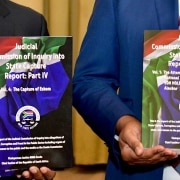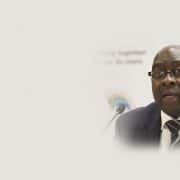|
Getting your Trinity Audio player ready...
|
The cabinet of the sixth administration was announced last night, and President Cyril Ramaphosa kept to the expectation – to a degree, but not completely – that he would cull those found to be unsuitable, or that were surplus to requirements. “We have made progress in examining the size and structure of the state, and will complete this work by the end of this administration,” he said during his State of the Nation Address earlier this year.
During former president Jacob Zuma’s tenure the size of the cabinet increased markedly, from 50 members under Thabo Mbeki and a lean 47 under Kgalema Motlanthe, to an overstuffed 73 by the time Zuma left office.
There are now 28 ministers, eight fewer than the previous cabinet of 36, and 34 deputy ministers. The reduction in size was an exercise in efficiency, Ramaphosa said. “To promote greater coherence, better co-ordination and improved efficiency, we have combined a number of portfolios, thereby reducing the number of ministers from 36 to 28.”
Half of the new cabinet members are women, and some ministries have two deputies – these are ministries that were combined. The Department of Trade and Industry joined that of Economic Development; Science and Technology joined with Higher Education and Training; and Arts and Culture joined with Sports and Recreation. Meanwhile, Environmental Affairs joined with Forestry and Fisheries, Agriculture combined with Land Reform and Rural Development, and Human Settlements joined with Water and Sanitation. The departments of energy and mineral resources also combined.
“We have also decided to add responsibility for infrastructure to the public works portfolio and to add responsibility for employment to the labour portfolio,” Ramaphosa said.
David Mabuza, after a delay while he met with the ANC’s integrity commission, remains deputy president. The committee had identified 22 party members as potentially unsuitable for public office – including Mabuza and Gwede Mantashe.
South Africans will note the absence in the new cabinet of controversial figures such as Bathabile Dlamini and Nomvula Mokonyane. However, some questionable choices still remain.
| Ministry | Minister | Deputy minister |
| Basic Education | Angie Motshekga | Dr Regina Mhaule |
| Higher Education, Science and Technology | Dr Blade Nzimande | Buti Manamela |
| Agriculture, Land Reform and Rural Development | Thoko Didiza | Sdumo Dlamini Mcebisi Skwatsha |
| Environment, Forestry and Fisheries | Barbara Creecy | Maggie Sotyu |
| Mineral Resources and Energy | Gwede Mantashe | Bavelile Hlongwa |
| Communications | Stella Ndabeni-Abrahams | Pinky Kekana |
| Cooperative Governance and Traditional Affairs | Dr Nkosazana Dlamini-Zuma | Parks Tau Obed Bapela |
| Defence and Military Veterans | Nosiviwe Mapisa-Nqakula | Thabang Makwetla |
| Employment and Labour | Thulas Nxesi | Boitumelo Moloi |
| Finance | Tito Mboweni | Dr David Masondo |
| Health | Dr Zwelini Mkhize | Dr Joe Phaahla |
| Home Affairs | Dr Aaron Motsoaledi | Njabulo Nzuza |
| Human Settlements, Water and Sanitation | Lindiwe Sisulu | Pam Tshwete David Mahlobo |
| International Relations and Cooperation | Dr Naledi Pandor | Alvin Botes Candith Mashego-Dlamini |
| Justice and Correctional Services | Ronald Lamola | John Jeffery Inkosi Phathekile Holomisa |
| Police | General Bheki Cele | Cassel Mathale |
| Ministry in the Presidency | Jackson Mthembu | Thembi Siweya |
| Ministry in the Presidency for Women, Youth and Persons with Disabilities | Maite Nkoana-Mashabane | Prof Hlengiwe Mkhize |
| Public Enterprises | Pravin Gordhan | Phumulo Masualle |
| Public Service and Administration | Senzo Mchunu | Sindy Chikunga |
| Public Works and Infrastructure | Patricia De Lille | Noxolo Kiviet |
| Small Business Development | Khumbudzo Ntshavheni | Rosemary Capa |
| Social Development | Lindiwe Zulu | Henrietta Bogopane-Zulu |
| Sports, Arts and Culture | Nathi Mthethwa | Nocawe Mafu |
| State Security | Ayanda Dlodlo | Zizi Kodwa |
| Tourism | Nkhensani Kubayi-Ngubane | Fish Mahlalela |
| Trade and Industry | Ebrahim Patel | Fikile Majola Nomalungelo Gina |
| Transport | Fikile Mbalula | Dikeledi Magadzi |







